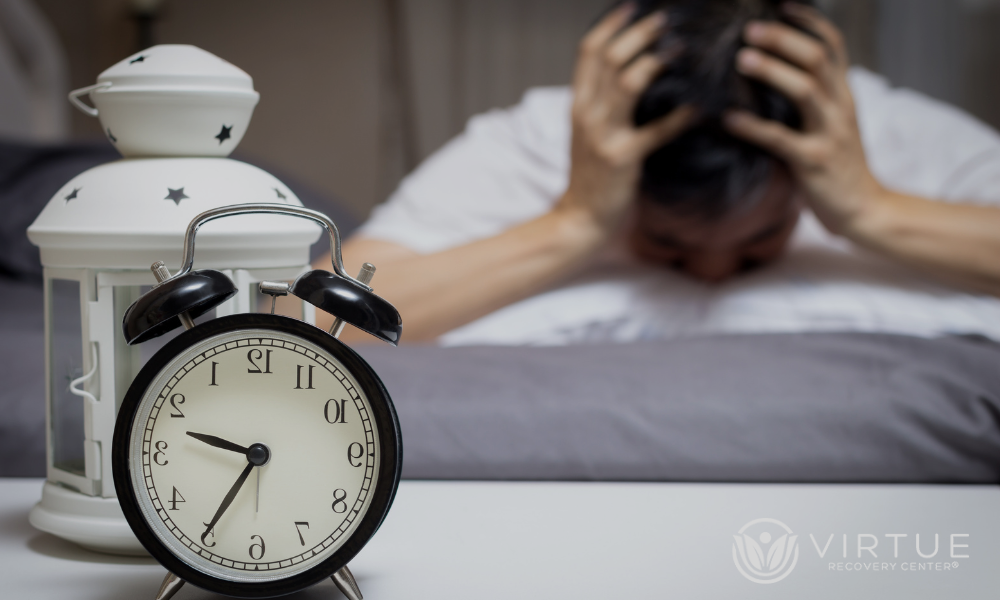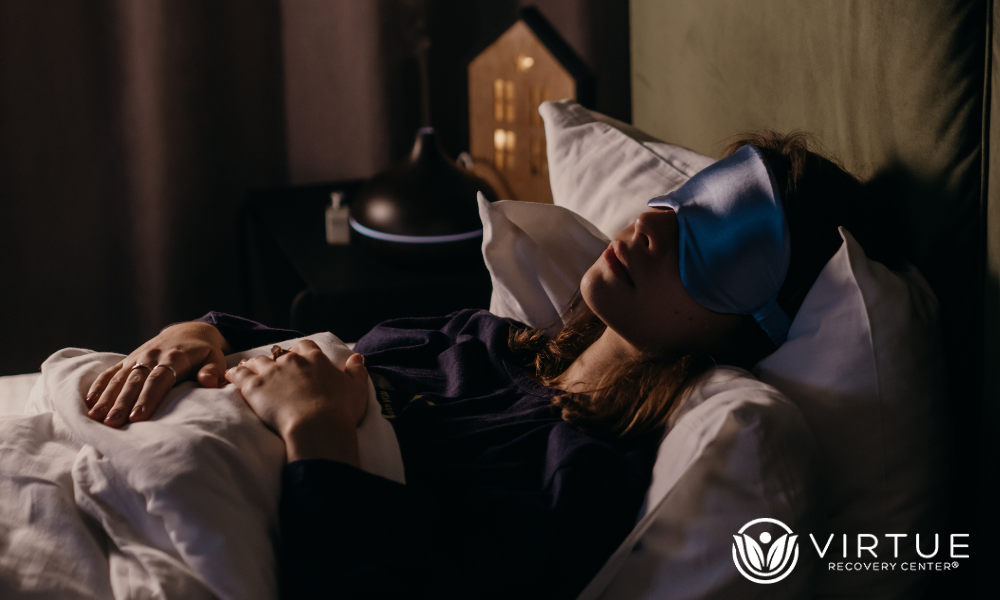Key Takeaways
- People who drink alcohol have trouble sleeping, especially during REM sleep, which makes them exhausted and emotionally drained.
- People who are getting alcoholism treatment are less likely to drink and sleep better.
- Taking care of your worries and any other problems you may have might help you feel better and sleep better.
- Holistic habits, treatment, and exercise can help people stay healthy and sober for an extended period.
- Doctors make sure that withdrawal indications don’t keep you from sleeping.
Introduction
Sleep is a vital part of our physical and mental well-being, yet alcohol often throws this balance off. People struggling with alcohol addiction frequently experience light, broken sleep, which leaves them tired, moody, and more vulnerable to relapse. Poor sleep affects memory, decision-making, and emotional stability, making recovery more complicated.
Structured alcohol addiction treatment programs address both sobriety and sleep health. By combining therapy, wellness strategies, and medical care, these programs help restore natural sleep cycles, improve overall well-being, and support lasting recovery.
How Does Alcohol Affect Sleep Cycles?

While alcohol may initially make people feel sleepy, it disrupts the crucial REM stage of sleep. REM sleep allows the brain to process emotions, consolidate memories, and repair itself. When alcohol reduces REM, sleep becomes shallow and fragmented. Over time, this creates fatigue, irritability, and even more cravings.
Research from PMC confirms that alcohol alters sleep architecture, leaving individuals less able to regulate emotions and more likely to relapse. The cycle is clear: poor sleep increases stress and cravings, which in turn worsen sleep quality. Understanding this cycle is essential to building recovery strategies that protect both health and sobriety.
Why Is Alcohol Addiction Treatment Essential for Restoring Sleep?
Structured treatment programs provide medical supervision to manage withdrawal symptoms, which themselves can disrupt sleep safely. Patients also learn about sleep hygiene, routine-setting, and coping mechanisms for stress and cravings.
Studies from PMC suggest that integrating sleep-focused care into addiction programs improves mood, focus, and overall recovery success. Programs may also include Heroin Addiction Rehab for individuals facing multiple substance use challenges, addressing overlapping factors that affect sleep and health.
How Does Anxiety Affect Sleep During Recovery?
Anxiety often accompanies alcohol addiction and can make sleep disturbances worse. Anxiety treatment can help manage racing thoughts, restlessness, and nighttime stress. Techniques like mindfulness, relaxation exercises, and cognitive-behavioral therapy improve sleep quality and emotional resilience.
Addressing both anxiety and alcohol addiction together ensures individuals achieve more profound, more restorative sleep. This not only improves mental health but also reduces the likelihood of relapse.
What Role Does REM Sleep Play in Recovery?
REM sleep is essential for brain restoration, emotional regulation, and memory consolidation. Alcohol significantly reduces REM duration, which can impair cognitive recovery and emotional stability. Rebuilding healthy REM cycles allows the brain to heal and supports better decision-making during sobriety.
Following simple sleep habits and guidance from resources like Harvard Health helps regulate circadian rhythms, promote restorative sleep, and strengthen recovery outcomes.
How Can Holistic Approaches Support Better Sleep?
Holistic rehabilitation focuses on the body, mind, and lifestyle. Exercise, mindfulness, proper nutrition, and daily routines help regulate sleep naturally. These approaches also improve mental clarity, emotional resilience, and physical health.
Holistic care, combined with medical supervision, gives individuals comprehensive support for both addiction recovery and sleep restoration. Minor adjustments, such as establishing a consistent bedtime, incorporating calming evening rituals, or engaging in light physical activity, can dramatically improve sleep quality.
Why Are Structured Programs Like Outpatient and Residential Treatment Effective?
Structured programs offer routine and accountability. Residential programs provide a safe, alcohol-free environment to focus on therapy, rest, and wellness. Outpatient programs allow people to maintain work or family responsibilities while receiving support.
These programs monitor sleep, teach stress management, and reinforce healthy habits. Patients learn coping strategies, develop relapse-prevention skills, and gradually restore natural sleep cycles. By combining therapy, wellness, and medical oversight, structured programs support both recovery and overall health.
YouTube Insight
Watch the video Learn About Alcohol Detox at Virtue Recovery Center to understand how medical supervision, therapy, and structured care restore natural sleep cycles while supporting recovery.
Conclusion
Alcohol disrupts sleep, particularly REM cycles, which can lead to fatigue, mood swings, and increased relapse risk. Comprehensive alcohol addiction treatment combined with anxiety treatment helps restore healthy sleep, improve mental clarity, and strengthen long-term sobriety.
If you or someone you love struggles with alcohol-related sleep issues, Virtue Recovery Center Killeen can help. Call 866-843-0545 today to begin a healthier sleep and recovery journey in Killeen and nearby areas.
Can Alcohol Addiction Treatment Help Improve Sleep Cycles if I’ve Mixed Valium and Vodka?
Alcohol addiction treatment can significantly improve sleep cycles, especially for those struggling with the harmful combination of substances. However, it’s crucial to understand the valium vodka risks involved. Mixing these substances can lead to severe health consequences, underscoring the importance of seeking professional help for recovery and restoring healthy sleep patterns.
FAQs
How does alcohol affect REM sleep?
Alcohol reduces REM duration, fragments rest, and increases fatigue and cravings, impairing emotional balance.
Can structured treatment restore sleep?
Yes, medical supervision and therapy help rebuild natural sleep cycles and improve well-being.
How does anxiety influence recovery sleep?
Anxiety worsens sleep quality, making therapy and stress management essential during sobriety.
Are holistic strategies effective for sleep?
Yes, mindfulness, exercise, nutrition, and routines support circadian rhythm regulation and improve recovery outcomes.
Why monitor sleep during treatment?
Monitoring ensures restorative REM sleep, reduces relapse risk, and supports mental and physical health.
Resources
- Alcohol and Sleep Disturbances. 2018. https://pmc.ncbi.nlm.nih.gov/articles/PMC5821259/
- Effects of Alcohol on Sleep Architecture. 2014. https://pmc.ncbi.nlm.nih.gov/articles/PMC3987855/
- What Happens During Sleep and How to Improve It. 2022. https://www.health.harvard.edu/staying-healthy/what-happens-during-sleep-and-how-to-improve-it
- About the Author
- Latest Posts
Gigi Price holds licenses as a Master Social Worker and Clinical Drug Counselor. She completed her master’s degree in Social Work at Texas State University. Over the last decade, Gigi has been dedicated to utilizing evidence-based practices to enhance patient care and treatment planning, resulting in positive, long-term outcomes for patients and their families. Her passion lies in creating a treatment environment where professionals collaborate to bring about positive change and provide a safe, trustworthy therapeutic experience. Patients can be confident in receiving top-quality care under her leadership.
In her role as the Clinical Director of Virtue Recovery Houston, Gigi conducted research to identify the most effective approaches for treating patients with acute mental health diagnoses, PTSD, and Substance Use Disorder. She then assembled a team of skilled clinicians who could offer various therapeutic modalities, such as Cognitive Behavioral Therapy (CBT), Dialectical Behavioral Therapy
(DBT), Acceptance and Commitment Therapy (ACT), Somatic Exposure, Eye Movement Desensitization and Reprocessing (EMDR), and Cognitive Processing Therapy (CPT). Gigi takes pride in overseeing the development and implementation of Virtue Houston’s Treatment Program, which includes two specialized therapeutic curricula tailored to the unique needs of individuals struggling with mental health issues, addiction, and PTSD.









